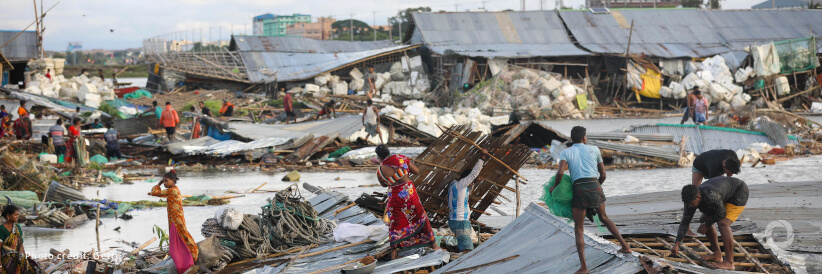Super cyclonic storm Mocha made landfall in Myanmar’s Rakhine state area, reaching a speed of over 150 mph, and crossing low-lying areas including Cox’s Bazar in Bangladesh. At least 8 people have been reported killed and the powerful storm has caused extensive destruction to infrastructure in the western Myanmar region, where thousands of internally displaced persons (IDPs) have been living in camps.
Oxfam and partners are currently assessing the scale of the devastation to mount a humanitarian response to provide clean water, sanitation, and hygiene facilities, as well as emergency cash and food.
“Our teams in Sittwe faced terrifying winds which damaged homes, toppled trees, and disrupted power and communication lines. The cyclone has devastated the IDP camps in Rakhine. Connection with our staff resumed this afternoon (on May 15) and are steadily receiving new reports, adding to the scale of devastation,” said Rajan Khosla, Oxfam Country Director in Myanmar.
An estimated 6 million people were already in humanitarian need in the states where the cyclone hit (Rakhine, Chin, Magway, and Sagaing). The needs of the community for essentials like shelter, clean water, and sanitation will only rise.
“The cyclone will immensely impact existing displaced people and particularly communities in Rakhine, and Chin. More resources are required, and we call on the international community to provide adequate funds required to help them live a life of dignity. We are working with local partners to respond. Our emergency response team is ready for deployment to Sittwe, and will arrive and immediately be the response as soon as the flights resume,” said Rajan Khosla.
In Bangladesh, while the cyclone’s path veered, the strong winds blew away the temporary bamboo homes in the Teknaf area of Cox’s Bazar.
“It is a relief that the cyclone passed without causing loss of life in the Rohingya camps in Cox’s Bazar. But the makeshift infrastructure in the camps could not withstand the strong winds. We have already started our response – we distributed cash to communities ahead of the storm and provided clean water for families to survive the night. Oxfam’s main relief efforts will focus on our area of expertise: providing safe water for people, as well as sanitation supplies and public health support, to help prevent the spread of water-borne diseases,” said Ashish Damle, Oxfam Country Director in Bangladesh.
Oxfam is working closely with local communities, partners, and authorities to ensure efforts are coordinated and the safety and well-being of those residing in the camps in Bangladesh.

